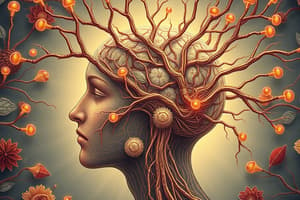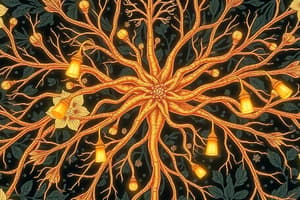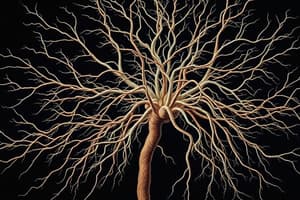Podcast
Questions and Answers
The ______________ regulates the body's internal functions and the way a person reacts to the world.
The ______________ regulates the body's internal functions and the way a person reacts to the world.
nervous system
The nervous system consists of two main parts: the ______________________ and the __________________________.
The nervous system consists of two main parts: the ______________________ and the __________________________.
central nervous system, peripheral nervous system
Neurons are composed of three parts: the cell body, the axon, and the _________.
Neurons are composed of three parts: the cell body, the axon, and the _________.
dendrite
The central nervous system consists of the ______ and the ___________.
The central nervous system consists of the ______ and the ___________.
In addition to transmitting messages between the brain, the muscles, and the glands throughout the body, the spinal cord is involved in ______________.
In addition to transmitting messages between the brain, the muscles, and the glands throughout the body, the spinal cord is involved in ______________.
The autonomic nervous system controls the ___________ muscles and internal organs of the body, whereas the somatic nervous system controls the _________ muscles and the sense organs.
The autonomic nervous system controls the ___________ muscles and internal organs of the body, whereas the somatic nervous system controls the _________ muscles and the sense organs.
The __________ nervous system prepares the body for dealing with emergencies; the ______________ nervous system helps the body calm down after dealing with an emergency.
The __________ nervous system prepares the body for dealing with emergencies; the ______________ nervous system helps the body calm down after dealing with an emergency.
Heart rate and blood pressure are functions that are regulated by the section of the brain known as the __________.
Heart rate and blood pressure are functions that are regulated by the section of the brain known as the __________.
Vision and hearing are regulated by the section known as the _________.
Vision and hearing are regulated by the section known as the _________.
Complex processes such as emotions are regulated by the section known as the __________.
Complex processes such as emotions are regulated by the section known as the __________.
The cerebrum includes the _______________, which is the part of the brain that is involved with thinking, language, memory, and perceptions.
The cerebrum includes the _______________, which is the part of the brain that is involved with thinking, language, memory, and perceptions.
The _______________ is the structure in the brain that connects the two hemispheres of the brain and aids in getting information from one side of the brain to the other.
The _______________ is the structure in the brain that connects the two hemispheres of the brain and aids in getting information from one side of the brain to the other.
Researchers study the brain by using imaging techniques such as the _________, which provides a three-dimensional view of the brain.
Researchers study the brain by using imaging techniques such as the _________, which provides a three-dimensional view of the brain.
Psychologists concerned with the biology of behavior study the ________ system because this body system consists of glands that secrete substances called ________, which help to stimulate body functions and affect behavior.
Psychologists concerned with the biology of behavior study the ________ system because this body system consists of glands that secrete substances called ________, which help to stimulate body functions and affect behavior.
The _________ gland is referred to as the 'master gland' because it secretes a large number of hormones that affect many kinds of behaviors, such as stimulating labor in pregnant women.
The _________ gland is referred to as the 'master gland' because it secretes a large number of hormones that affect many kinds of behaviors, such as stimulating labor in pregnant women.
____________ is a male sex hormone that aids in the development of secondary sex characteristics.
____________ is a male sex hormone that aids in the development of secondary sex characteristics.
________, produced in the ovaries, is the female hormone that aids in the development of secondary sex characteristics; ____________, also produced in the ovaries, is the hormone that helps prepare the body for pregnancy.
________, produced in the ovaries, is the female hormone that aids in the development of secondary sex characteristics; ____________, also produced in the ovaries, is the hormone that helps prepare the body for pregnancy.
Psychologists study ________, the transmission of characteristics from parents to offspring, as a way of understanding how and why people behave as they do.
Psychologists study ________, the transmission of characteristics from parents to offspring, as a way of understanding how and why people behave as they do.
The _____________________ is a controversy about the role that biology and environment play in determining psychological traits in humans.
The _____________________ is a controversy about the role that biology and environment play in determining psychological traits in humans.
Psychologists use _______________ to determine the role that heredity and the environment play in determining a trait.
Psychologists use _______________ to determine the role that heredity and the environment play in determining a trait.
In studies of identical twins reared apart, similarities noted would most likely be due to_______ factors.
In studies of identical twins reared apart, similarities noted would most likely be due to_______ factors.
There are 4 major areas of study for biological psychologists, they are:
There are 4 major areas of study for biological psychologists, they are:
The peripheral nervous system consists of...
The peripheral nervous system consists of...
Which system within the peripheral nervous system contains the parasympathetic and sympathetic nervous system?
Which system within the peripheral nervous system contains the parasympathetic and sympathetic nervous system?
What are the 5 areas of study within the endocrine system?
What are the 5 areas of study within the endocrine system?
Your environment consists of what five things?
Your environment consists of what five things?
Heredity affects what two things?
Heredity affects what two things?
Heredity is determined by _____ found in _____________.
Heredity is determined by _____ found in _____________.
Flashcards are hidden until you start studying
Study Notes
Nervous System Overview
- The nervous system regulates internal functions and external reactions.
- Comprises two main parts: central nervous system (CNS) and peripheral nervous system (PNS).
Neurons and Their Structure
- Neurons consist of three main parts: cell body, axon, and dendrites.
Central Nervous System
- The central nervous system is made up of the brain and spinal cord.
- The spinal cord transmits messages and is involved in spinal reflexes.
Autonomic vs. Somatic Nervous System
- The autonomic nervous system regulates involuntary muscles and internal organs.
- The somatic nervous system governs voluntary muscles and sense organs.
Sympathetic and Parasympathetic Systems
- The sympathetic nervous system prepares the body for emergencies.
- The parasympathetic nervous system promotes calm after emergencies.
Brain Sections and Functions
- The hindbrain controls functions like heart rate and blood pressure.
- The midbrain is responsible for processing vision and hearing.
- The forebrain manages complex processes, including emotions.
Cerebrum and Brain Connectivity
- The cerebrum contains the cerebral cortex, linked to thinking, language, memory, and perception.
- The corpus callosum connects the brain's hemispheres, facilitating information transfer.
Brain Imaging Techniques
- Imaging techniques like CAT scans offer three-dimensional views of the brain.
Endocrine System and Hormones
- The endocrine system comprises glands secreting hormones affecting body functions and behavior.
- The pituitary gland is known as the "master gland" due to its wide-ranging hormonal influences.
Sex Hormones
- Testosterone is the male hormone promoting the development of secondary sex characteristics.
- Estrogen aids in female secondary characteristics, while progesterone prepares the body for pregnancy.
Heredity and Behavior
- Heredity involves the transmission of characteristics from parents to offspring.
- The nature-nurture debate explores the impact of biology versus environment on psychological traits.
Research Methods in Heredity
- Identical twins studies help determine the roles of heredity and environment in traits.
- Similarities noted in twins raised apart are attributed to genetic factors.
Biological Psychologist's Focus Areas
- Four major study areas: nervous system, endocrine system, environment, and heredity.
- The peripheral nervous system comprises the somatic and autonomic nervous systems.
Endocrine System Components
- Major components include adrenal gland, thyroid gland, pituitary gland, testes, and ovaries.
Environmental Influences
- Environment influences behavior through family, education, culture, living conditions, and experiences.
Heredity's Impact
- Heredity affects physical appearance and psychological traits.
- Genetic information is carried by genes located in chromosomes.
Studying That Suits You
Use AI to generate personalized quizzes and flashcards to suit your learning preferences.





